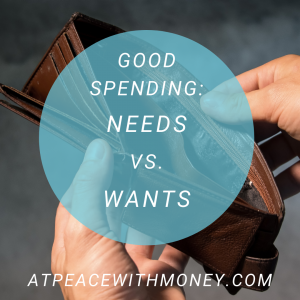
One spending guideline that is indispensable is identifying your needs versus your wants. Difficulty understanding this can result in either over-spending or over-saving. Ultimately, it can reflect a lack of clarity around our values around money. If you feel stumped by this concept, or aren’t sure how your spending behavior measures up, don’t worry! We’re going to parse out the details right here:
Needs vs. Wants
Many of us are familiar with differentiating between needs and wants. It’s a skill we cultivate throughout our lifetimes. Although we sometimes run into pitfalls, we are ultimately making thousands of decisions a day – it’s important to have a little compassion for ourselves when we’re thinking about our financial decision making.
So, what makes a need, a need and a want, a want? Basic necessities you need to take care of yourself and live with a certain degree of comfort are needs. Nutritious food, sound housing, quality clothes and shoes, and things like electricity, car insurance, etc. definitely fall into the need category. We also have needs related to caring for ourselves. This is where things can get tricky – many people have difficulty differentiating between needs and wants here. When considering a purchase, it can be helpful to try and identify the underlying need. For example, if you want to spend money on a day-long spa retreat, but what you really want is some quiet time to yourself, there are likely other ways you could meet that need. Especially if it’s a matter of staying in your budget or not, sussing out the need underlying the want can be very helpful.
Over-spender, or Over-saver?
 You may have some idea of whether you fit into either category. If you’re not sure what over-saving is, I recommend reading my article about it – it could be enlightening. When it comes to identifying needs vs. wants, over-spenders and over-savers tend to behave differently. Over-spenders frequently feel every purchase is filling a need, while over-savers tend to see every potential purchase as a want. In both cases, these spending habits can cause problems. Over-spenders can find themselves without important savings accounts or in debt, while over-savers can hold off on essential purchases like medical expenses. Both behaviors result in a deficit of self-care. To really take care of ourselves financially, we need to find a midpoint, where we have our needs met, and a few of our wants too. Someone who has really good thinking about this is Vicki Robin, who speaks poetically about finding your “enough” in Your Money or Your Life. You can read my book review here.
You may have some idea of whether you fit into either category. If you’re not sure what over-saving is, I recommend reading my article about it – it could be enlightening. When it comes to identifying needs vs. wants, over-spenders and over-savers tend to behave differently. Over-spenders frequently feel every purchase is filling a need, while over-savers tend to see every potential purchase as a want. In both cases, these spending habits can cause problems. Over-spenders can find themselves without important savings accounts or in debt, while over-savers can hold off on essential purchases like medical expenses. Both behaviors result in a deficit of self-care. To really take care of ourselves financially, we need to find a midpoint, where we have our needs met, and a few of our wants too. Someone who has really good thinking about this is Vicki Robin, who speaks poetically about finding your “enough” in Your Money or Your Life. You can read my book review here.
I hope these thoughts will help you examine your own spending behaviors. If you’re interested in a little more self care, check out my Facebook page for Financial Self Care Fridays, all month at 8am PST via FB Live. I’m providing prompts and accountability to help you develop a financial self care habit. I hope you’ll join me!
Angela
Image by: Artem Beliaikin






